The Indian tech investor, entrepreneur and billionaire shares the promise of AI, why the US needs to move faster to compete with China and the UAE's advantage in building AI.
| Divyank Turakhia, an Indian, is a technology entrepreneur and investor based in Dubai. He started his business at the age of 14 and has since founded and sold several innovative companies, the most notable of which is Media.net. He founded Media.net in 2010 and sold it to a Chinese conglomerate for $900 million in 2016. |
Here is a conversation between Divyank Turakhia and Rest of World Editor-in-Chief Anup Kaphle at an event organized by Rest of World in collaboration with Luminate on AI.
Div, one of my favorite stories about you is that you learned to code when you were 8 or 9 years old. You are now a serial entrepreneur and working on your fourth internet company — Ai.tech. Why did you want to start an AI company?
I think I was very lucky to have found what I loved so early. And so the journey started early. The company you mentioned was my fourth company. After the third company, I took a long break, which was great.
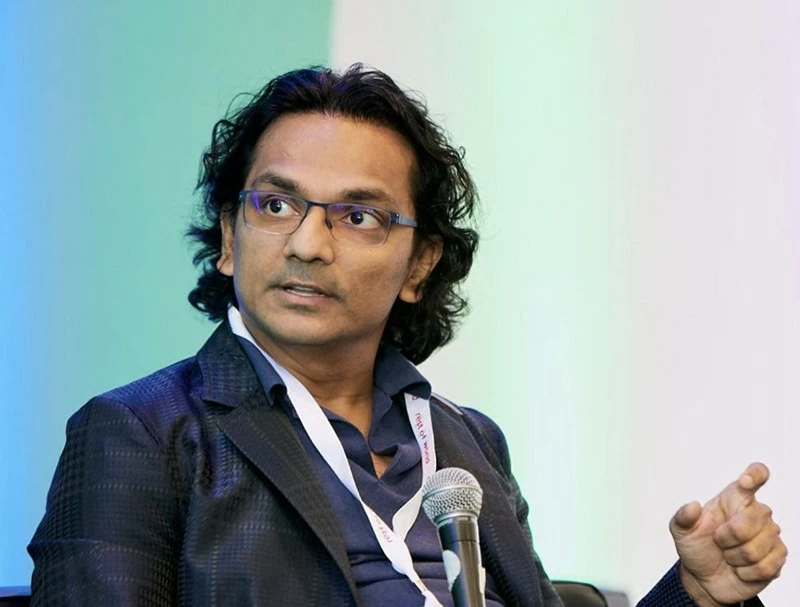 |
| Divyank Turakhia, an Indian, is a technology entrepreneur and investor based in Dubai. |
How long is a vacation?
I said two years minimum; but it was actually three. And after that point, I started my fourth company. I built it as a holding company that we could build and incubate multiple businesses. AI became a buzzword that everyone knew about, starting around November 2022 when ChatGPT launched. And everyone thought it was awesome.
I've been involved in this space for a long time. Right before we launched Media.net, we wanted to do something called contextualizing large amounts of content. And at that time, there was nothing like AI. We were using CPUs to do better matching across a lot of content as we browsed the internet. So I've had that experience for a long time.
When you build any business, if you want to be successful, you want to identify your core strengths, you want to double down on them. And I realized over time that my core strengths are deep technology and operational efficiency, which is taking any process and figuring out how to make it cheaper, faster, and more scalable. I feel like AI is going to be in everything. We're in the early stages of understanding the applications. In 20 years, AI will be in everything and almost invisible.
Which AI use case are you most excited about?
I would say efficiency. If you think about what AI does for you, it adds a layer of efficiency, it increases productivity. Everyone I talk to, in the surveys I read, with tools like ChatGPT today, anyone who uses them to code or write or analyze something, you see a gain of about 10% to 15%. I think that's the beginning of what we're going to see because there are two distinct paths: One is, large language models get much smarter by using more data. And the cost of training these large models is insane. They started at $10 million, now each large language model costs over $100 million and will soon be in the billions. The second path is small, much more specific models, and we're going to see a lot of smaller models used in a lot of different applications because the number of large models that can exist is very small. They won't solve every use case.
One of the first things people talk about when they hear about AI is what it means for job security. What happens when AI comes to outsourcing countries like Kenya or the Philippines?
Or India. We've seen this over and over again: Every time there's a powerful tool that's used in the world, people think about what happens to their work. People are creative enough. They'll figure out how to use and incorporate that additional tool. Whether you're talking about the Industrial Revolution or the transition from horses to cars or cars to planes or from no computers to computers. Different economies will have to figure out what their core strengths are. I'll take India as an example: India historically has not been the best at infrastructure or investing in infrastructure, so I don't really expect India to build big data centers. They've built data centers, they're very proud of 10,000 GPUs, and 10,000 GPUs doesn't really make a difference if you're basically looking at some kind of big enough language model.
At the same time, India has 1.4 billion people — that’s a huge pool of talent. Because big models aren’t going to solve everything, they’re just tools to use to incorporate one of those things. If you look at the current Indian outsourcing companies, like Wipro or HCL, they’re all consulting with companies around the world on how to incorporate AI into their business processes. You’ll see a lot more coming from an outsourcing place where they’ve learned new tools. Because they already have a lot of knowledge about the technology, they have the advantage of being able to learn new things faster and they can help businesses just like they’ve helped them in the past with other things.
You are currently based in Dubai and are also a member of the UAE government ’s AI Council. Companies are spending a lot when it comes to investment. Can you tell us what countries like the UAE are hoping to achieve?
I can talk more specifically about the UAE because I was there for a long time. The UAE started its AI journey earlier than most other countries. They appointed an AI Minister in 2017. The next country, to my knowledge, to appoint an AI Minister was South Korea in 2020, three years later. If you think about the UAE in particular, they only have a population of about a million people who are native speakers. It is a resource drought because one of the Emirates, Abu Dhabi, has oil money. The other Emirates have to figure out how to deal with it. In Dubai's case, they only have access to 3% of the oil resources. So they turned very early to tourism and have done very well. And Dubai is very good at infrastructure. The second thing about the UAE is that in a sense it is a miniature version of America because 90% of the population is expatriate. So they have 10 million people in the country, 90% of whom have moved to other countries in search of opportunities. Whenever you talk about a population that moves to different countries in search of opportunities, these are people who are generally more in a hurry, who generally want to get more done, who generally want to push boundaries. And so they adopt newer technologies or figure out how to capture new opportunities faster. And so from the UAE perspective, whenever there is something new that is a game changer, they want to incorporate it. So they have gone into AI.
The other part of that is sovereign wealth funds. The UAE has one of the largest sovereign wealth funds. It’s not just one, it has over eight. Between Abu Dhabi and Dubai, they manage over $2 trillion. These sovereign wealth funds have invested all over the world, with a lot of the regular private equity funds like Blackstone or Apollo or whatever, who have raised money from sovereign wealth funds and hedge funds. They saw these trends early enough that they felt like this is a place where they wanted to invest heavily because it would have an economic return that would be superior to the investment. That would be another reason.
Aside from having a smaller population, which means AI is needed to achieve a lot because of the automation and the scale, there's basically enough money to make that investment. The third part is energy. Any big AI investment requires a lot of energy. And the advantage that the UAE has is that because they have good infrastructure, they always overuse that infrastructure. So both Abu Dhabi and Dubai have backup power, which is not the case in many countries, and that backup power can be used to build large data centers and kind of scale up processes, larger models can be built.
Viewed from the Gulf, how do the US and China compete to own the backbone of AI?
From what I see and what I read, I understand that China is about six months behind the United States — not too far, which is worrying. So the United States needs to do a lot more to figure out how to move faster, how to make sure they don't over-regulate in any way so they can move faster because China doesn't have that problem. They have a different kind of problem. The advantage of being in the UAE is that you can see both sides. Because the UAE is so small, their advantage is that they can be friendly to everyone. And they are. It's one of those unique places where 90% of the population is expatriates. Among those people, you'll see Russians, Chinese, Americans, Europeans all coming together, and no one cares about the larger politics. People care more about economic opportunity than they care about the politics that's going on in front of them.
That's how I think. I think China is really good at hardware, the US is really good at software. You see those differences. China manufactures at scale, it's really hard to do that outside of China, and obviously the US has realized that was a mistake and is investing in as many additional places as possible so that they don't have a single point of failure with the expanded hardware. The UAE has made a choice in this because they were asked to make a choice and they chose the US in terms of AI. So all of the UAE's platforms are US-specific and they don't use anything Chinese.
Is there anything about the AI situation that keeps you up at night?
Nothing keeps me up at night; I sleep very well. I think I think about it in a positive way. Yes, there are challenges with any new technology, and yes, it can be used for bad purposes. That's the case with everything that's been released. On the positive side, there have been a lot of efficiency gains for humanity. If you read the news every day, you think we're in the worst time ever. If you don't read the news every day, you think we're actually in the best time ever, technically.
I grew up in India. Just 70 years ago, I wouldn't have had the luxuries that I have today. That's true for everyone. Most people have a better quality of life and with AI, the quality of life will improve dramatically as we continue to think about how to make it more cost-effective because it's not cost-effective today. Not everyone can afford it today. In fact, I looked at a statistic: ChatGPT only has 11 million paying users. That basically means that all the people who are not paying users don't have access to the best models and don't have access to the level of efficiency that can be created. I think that will obviously change over time. It's interesting because I think ChatFPT improves the quality of life for people and improves almost everything, including the relationship between countries because as things go faster and things become more automated, things become more efficient. And that's a good thing.
Source: https://baoquocte.vn/trung-quoc-chi-con-cham-hon-6-thang-ve-ai-va-hoa-ky-can-phai-hanh-dong-nhanh-hon-288034.html


![[Photo] General Secretary To Lam receives the Director of the Academy of Public Administration and National Economy under the President of the Russian Federation](/_next/image?url=https%3A%2F%2Fvphoto.vietnam.vn%2Fthumb%2F1200x675%2Fvietnam%2Fresource%2FIMAGE%2F2025%2F12%2F08%2F1765200203892_a1-bnd-0933-4198-jpg.webp&w=3840&q=75)

















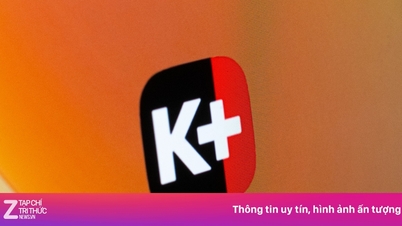

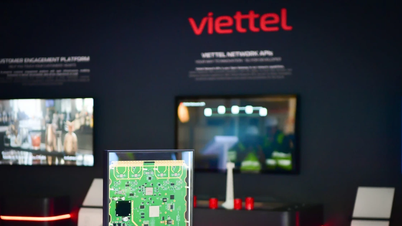










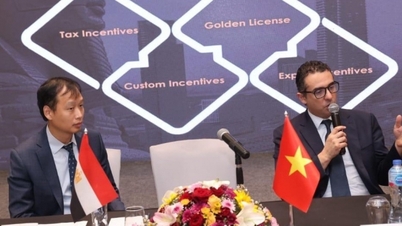












































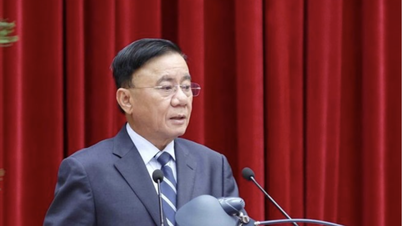


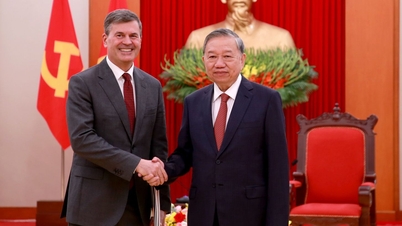












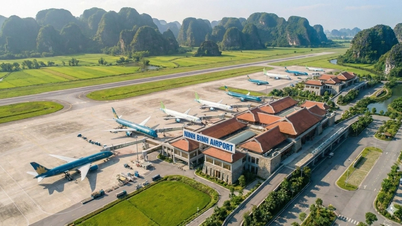




















Comment (0)